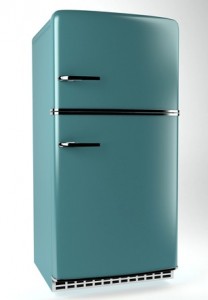 Last fall, I was interviewed by Martha Stewart Magazine for some refrigerator organizing tips. A quick peek in my fridge last week reminded me that I needed to give that space a little refreshing! It’s easy to let organization slide in the summer months, but all that great farmer’s market produce goes to waste when it’s not easily accessible and visible. If your refrigerator a black hole of fuzzy cheese, past-their-prime veggies, and unidentifiable leftovers, then these 12 tips will help you take your fridge from funky to fresh! Begin by purging outdated and unsavory foods. Then, wipe down all shelving and bins so they’re squeaky clean. With your fresh slate, keep these storage tips in mind as you return foods to the fridge:
Last fall, I was interviewed by Martha Stewart Magazine for some refrigerator organizing tips. A quick peek in my fridge last week reminded me that I needed to give that space a little refreshing! It’s easy to let organization slide in the summer months, but all that great farmer’s market produce goes to waste when it’s not easily accessible and visible. If your refrigerator a black hole of fuzzy cheese, past-their-prime veggies, and unidentifiable leftovers, then these 12 tips will help you take your fridge from funky to fresh! Begin by purging outdated and unsavory foods. Then, wipe down all shelving and bins so they’re squeaky clean. With your fresh slate, keep these storage tips in mind as you return foods to the fridge:
- Items that you store on the door will be subject to slight temperature drops each time you open the door, so opt to place things that don’t spoil easily in this area. Condiments, soda, juice, and open bottles of wine are good in the door. Milk and eggs are not.
- Generally, the bottom shelf is the coldest, so store your meats (in their original packaging) here. That also helps keep any drips from contaminating foods underneath them.
- Fruits and veggies give off different types of gases, so don’t store them together. Vegetables go in the crisper, fruits in the fruit drawer. Cold cuts and cheese can go in the deli drawer.
- Designate one shelf to store leftovers, and store them in clear containers so you can easily see what you have.
- Encourage healthy eating habits by storing good-for-you foods near the front of the fridge in easy-to-grab containers.
Then, to make better use of your fridge’s space, follow these tips:
- Group similar things together. For example, place all drinks on one shelf, veggies in one drawer, fruits in another, condiments on the shelves in the door, leftovers in one designated area, and yogurt, sour cream, and cottage cheese together on one shelf.
- Containerize categories of items for easy accessibility. Invest in simple organizing tools, such as a Lazy Susan to hold condiments or a low, open-top bin to corral small jars.
- Use a label maker to label drawers, shelves, and containers with the general category of foods stored there. This not only makes it easy to locate the foods you need, but also allows family members to return foods to the correct area after meal prep and grocery shopping.
- Don’t forget that you can adjust a fridge’s shelves to maximize space.
- Keep items you use most frequently near the front and at eye level.
- Store taller items in the back of the fridge and shorter items in front of them for easy visibility.
- Do a five-minute tidy-up the evening before garbage day, purging anything expired or past its prime.
Happy refrigerator organizing!
